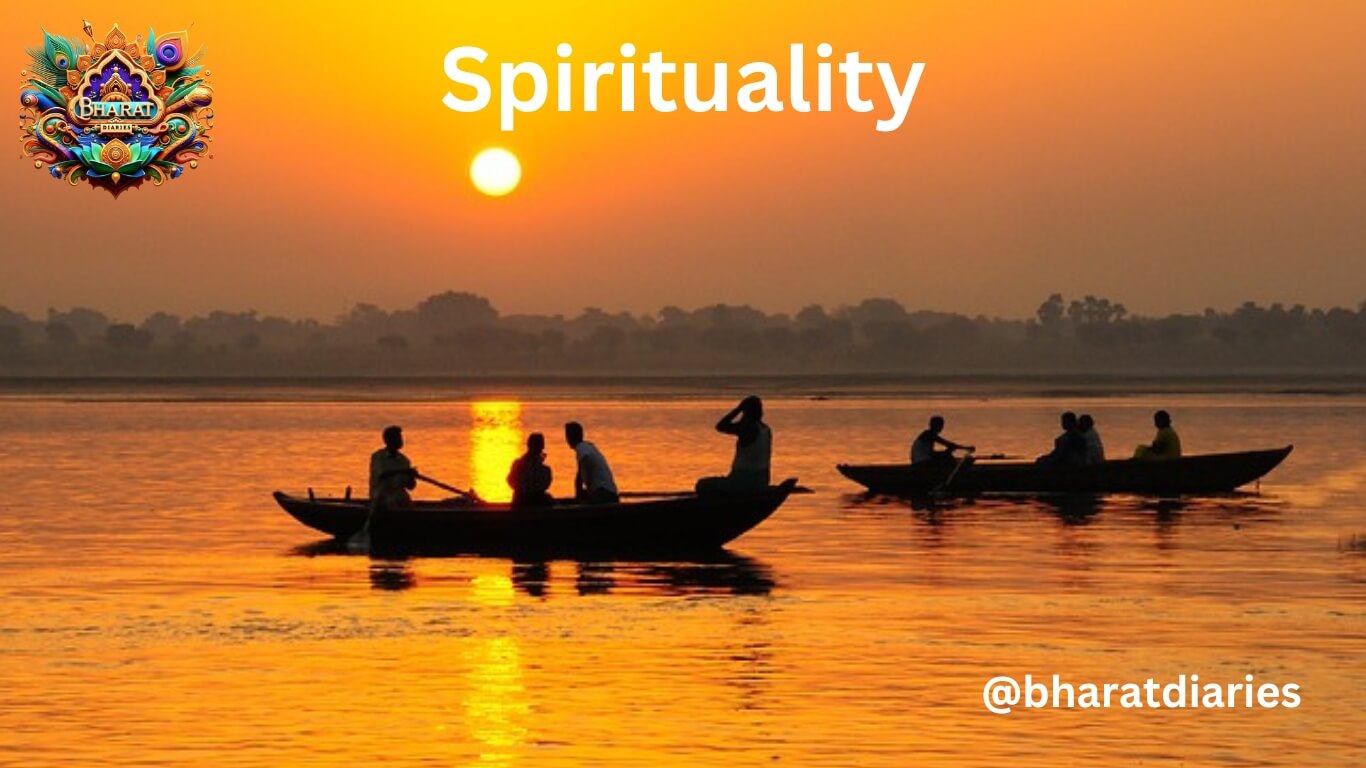
Explore India’s rich spiritual heritage and discover the teachings of Indian spiritual leaders like Swami Vivekananda, Guru Nanak Dev, Adi Shankaracharya, and Ramakrishna Paramahamsa.
Table of Contents
Introduction
India has always been synonymous with spirituality. Known as the land of saints, sages, and spiritual wisdom, it is a place where the material meets the divine. Spirituality, or adhyatama, lies at the heart of Indian culture and traditions, influencing the way people think, live, and connect with the universe.
From ancient scriptures to modern spiritual movements, India’s journey is filled with profound teachings and timeless wisdom. This blog takes you on a deep dive into India’s spiritual heritage, exploring its foundation, the lives of key spiritual leaders, and its impact on modern society.
https://bharatdiaries.com/the-rise-of-indian-defence-a-deep-dive-into-indias-modern-military-power/
What is Indian Spirituality?
Understanding Adhyatama
Adhyatama, or spirituality, in India refers to the pursuit of self-realization and universal truth. Unlike religion, which often focuses on rituals and dogmas, spirituality delves into understanding the inner self and one’s connection to the cosmos.
Ancient Indian scriptures like the Vedas, Upanishads, and the Bhagavad Gita provide a strong foundation for spirituality. They teach us that the ultimate goal of life is liberation (moksha)—freedom from the cycle of birth and death.
A Way of Life
In India, spirituality is not confined to temples or monasteries. It is woven into everyday life. From the morning chants of mantras to evening prayers, Indians imbibe spirituality in their daily routine. This spiritual connection can be seen in the practice of yoga, meditation, and even the celebration of festivals like Diwali and Holi.
The Pillars of Indian Spirituality: Great Spiritual Leaders
Adi Shankaracharya: The Beacon of Advaita Vedanta
Adi Shankaracharya, born in Kerala in the 8th century, was one of the most influential philosophers of Indian spirituality. He established the doctrine of Advaita Vedanta, which teaches the oneness of the individual soul (atman) and the universal soul (Brahman).
Contributions:
- Revived Hinduism during a period of decline and confusion.
- Authored commentaries on the Bhagavad Gita, Upanishads, and Brahmasutras, making these complex texts accessible.
- Founded four spiritual centers (mathas) across India to unify spiritual practices.
Shankaracharya’s teachings inspire millions to seek higher truth and embrace the concept of universal unity.
Swami Vivekananda: Bridging East and West
Swami Vivekananda, a disciple of Ramakrishna Paramahamsa, is celebrated for bringing Indian spirituality to the global stage. His powerful speech at the Parliament of the World’s Religions in 1893 introduced the West to the idea of religious harmony and spiritual awakening.
Key Teachings:
- Advocated for karma yoga (selfless service) as a path to spirituality.
- Stressed the importance of self-confidence and inner strength.
- Founded the Ramakrishna Mission, dedicated to education, healthcare, and spiritual growth.
Vivekananda’s message of universal brotherhood and spiritual awakening continues to resonate worldwide.
Guru Nanak Dev: The Pioneer of Sikhism
Guru Nanak Dev, the founder of Sikhism, emphasized devotion, equality, and selfless service. Born in Punjab in 1469, he traveled extensively to spread his message of oneness with God.
Key Contributions:
- Introduced the concept of Naam Japna (chanting God’s name) as a means of spiritual growth.
- Established the practice of langar (community kitchen), promoting equality and compassion.
- Taught that God resides within every individual, beyond caste, religion, or gender.
Guru Nanak’s teachings form the foundation of Sikhism and inspire people to live a life of truth, humility, and service.
Ramakrishna Paramahamsa: The Mystic of Kali
Ramakrishna Paramahamsa, a 19th-century saint from Bengal, was a beacon of spiritual enlightenment. A devotee of Goddess Kali, he believed that all religions lead to the same divine truth.
Key Teachings:
- Encouraged the direct experience of God through meditation and devotion.
- Practiced and respected multiple religious paths, demonstrating their unity.
- Inspired his disciples, including Swami Vivekananda, to spread spirituality globally.
The Bhakti Movement: Devotion as a Path to God
The Bhakti movement, which emerged between the 7th and 17th centuries, emphasized love and devotion to God over rituals and dogmas. Saints like Kabir, Meera Bai, and Tulsidas preached the importance of a personal connection with the divine.
Key Features of the Bhakti Movement:
- Promoted equality by rejecting caste and gender-based discrimination.
- Advocated for devotion (bhakti) as the simplest path to God.
- Unified people through spiritual poetry, music, and storytelling.
Spiritual Luminaries of Southern India
Ramanujacharya: The Philosopher of Vishishtadvaita
Ramanujacharya, a theologian and philosopher from Tamil Nadu, emphasized qualified non-dualism (Vishishtadvaita). He taught that devotion and surrender to God lead to liberation.
Contributions:
- Promoted temple worship and devotional practices.
- Advocated for the inclusion of all communities in spiritual practices.
Basavanna: The Social Reformer and Saint
Basavanna, a 12th-century saint from Karnataka, founded the Lingayat sect, emphasizing monotheism and social equality.
Teachings:
- Rejected caste-based discrimination.
- Advocated for a direct relationship with God without intermediaries.
- Encouraged the use of poetry (vachanas) to express spiritual thoughts.
How Indian Spirituality Shapes Modern Lives
The Rise of Yoga and Meditation
Yoga and meditation, rooted in Indian spirituality, have gained global popularity. Practices like pranayama (breath control) and mindfulness are widely used to reduce stress and improve mental well-being.
Spiritual Tourism
India’s spiritual destinations, like Varanasi, Rishikesh, Bodh Gaya, and Amritsar, attract millions of seekers from across the globe. These places offer a unique blend of spiritual solace and cultural richness.
Values in Modern Work Culture
Many Indian companies are incorporating spiritual values like empathy, mindfulness, and ethical responsibility into their work culture. This approach fosters harmony and productivity.
Conclusion
India’s spiritual essence is timeless, offering lessons that transcend generations. The teachings of luminaries like Adi Shankaracharya, Swami Vivekananda, and Guru Nanak Dev remind us of the importance of self-realization, compassion, and universal unity.
As the world seeks solutions to challenges like stress and inequality, India’s spiritual wisdom serves as a guiding light, inspiring people to lead balanced and meaningful lives.
